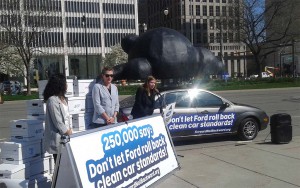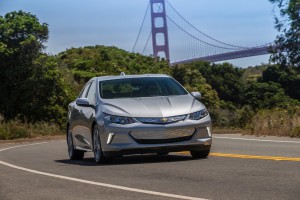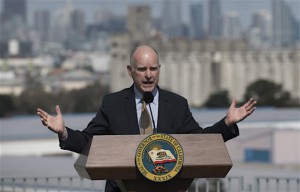The California Air Resources Board has come out swinging in its battle with over clean-air and fuel efficiency standards.
CARB, which will bear the burden of any clash with the administration, re-affirmed its commitment to the standards set in place by an agreement between the State of California and the Obama administration to ensure that cars and light-duty trucks for model years 2021–25 continue to meet standards that protect public health, save consumers money, and fight climate change.
“Dirty, gas guzzling vehicles are a direct assault on public health and foreclose our ability to rein in air pollution and greenhouse gases,” said CARB Chair Mary D. Nichols in a statement. “California will take all actions to ensure that the smart standards we developed in partnership with the auto industry to cut greenhouse gas emissions from vehicles stay in place.”
Under CARB’s existing regulation, adopted in 2012, cars meeting federal standards for model years 2017–25 are “deemed to comply” with California standards. It also created a single national program allowing automakers to meet one set of fleet-wide standards throughout the nation, including in California and the 12 other states that have adopted California standards.
(Automakers caught “in limbo” as new CAFE rules face major hurdles. Click Here for the story.)
Last week, however, the Trump administration proposed to change the federal regulation and freeze vehicle greenhouse gas standards at 2020 levels, Nichols said.

Automakers are caught in the middle over the CAFE debate and could face even more challenges if the proposed Trump rollback drags on in court.
The proposed amendment announced by would clarify California’s existing regulation to ensure that if the U.S. EPA changes its standards, then automakers wishing to sell cars in California after the 2020 model year would need to meet California’s standards — and not possibly weaker federal greenhouse gas standards in the future.
The “deemed-to-comply” provision was never meant to allow a massive federal rollback to weaken public health protections in California, Nichols said.
California’s decision is nationally significant because the state is the largest U.S. auto market. Also, a dozen states and the District of Columbia have adopted California’s emissions rules, accounting for more than a third of all U.S. vehicle sales.
(Click Here to see why auto suppliers are growing pessimistic about near-term prospects.)
Automakers have been campaigning both publicly and behind the scenes, have been lobbying for some kind of compromise that that would avert a long legal battle between California and the Trump administration. Automakers, who are deep into planning for 2020 and 2021 model years, also are preparing to ignore the new fuel-economy rules proposed by the EPA.
Analysts also are warning that following the standards proposed by Trump could be harmful to the long-term competitive position of U.S. automakers such as General Motors, Ford Motor Co. and even Fiat Chrysler Automobiles N.V., whose new CEO, Mike Manley, dined with Trump at the White House this week.
“The EPA decision reflects a short-horizon outlook on business, aimed at quick profits for industry and overlooks the prospect of a long-term decline in competitiveness and the impact on customers,” said Joern Buss, an analyst with Oscar Wyman.
“While other countries are passing future bans on internal combustion engines, the U.S. industry has focused on encouraging the obsession Americans have with pickups and SUVs. It produces quarterly profits, but at the cost of market share: American-produced cars commanded close to 70% of the global market in the 1960s; by 2025 that percentage will fall below 15%. U.S. carmakers are even abandoning production of sedans and crossovers, in favor of pickups and SUVs. Yet, American pickups are hardly ever sold outside of North America,” Buss noted.
(For the complete story on what the CAFE changes include, Click Here.)
Buss added one cannot blame this collapse of market share on strict regulation – Europe and Japan have had higher fuel economy standards. “In fact, the U.S. lost considerable share to the Japanese in the 1970s and 1980s in part because of their vehicles’ higher performance on fuel. And it’s not because of unreasonable labor – European unions are far more powerful than their U.S. cousins,” Buss said.


